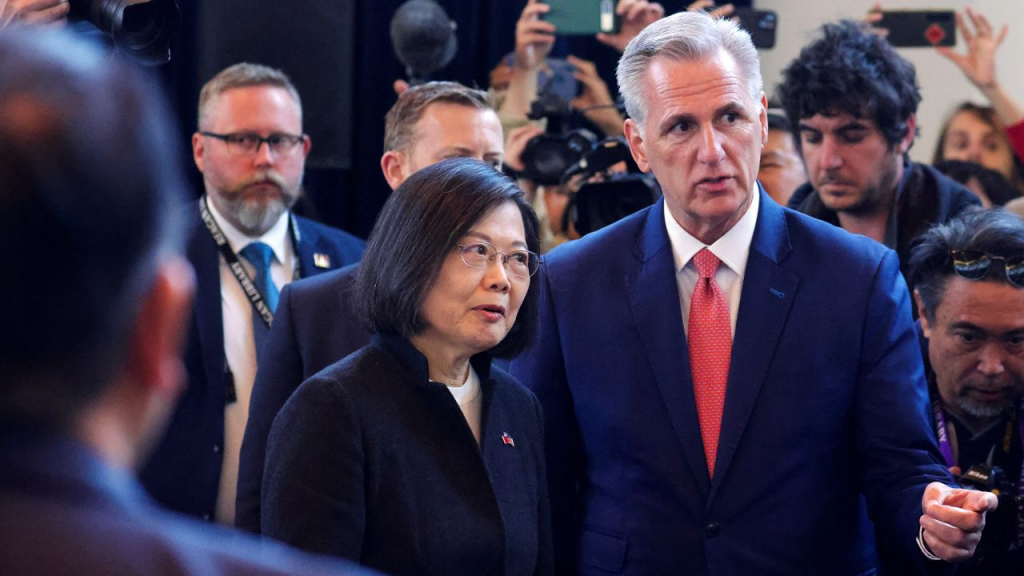Published: April 11,2023
By Gerald Mbanda

Taiwan’s president, Tsai Ing-wen, recently visited theUnited States amid Beijing protest where the U.S is believed to support Secessionist acts of “Taiwan independence, “at a time the U.S is well aware that Taiwan is an inalienable part of China. , Tsai was shown in photographs holding a meeting with U.S House Speaker Kevin McCarthy at the Ronald Reagan Presidential Library. Tsai meeting with McCarthy is part of a continuous series of provocations that seriously violates the one-China principle, and harmsChina’s sovereignty and territorial integrity. Last year, the speaker of the U.S House of Representatives NancyPelosi visited Taiwan again amid protests by China. She was the first sitting speaker to visit Taiwan in about 25 years.
Although the U.S continues to provoke China, the three communiqués to which the former is signatory clearly clarifies that Taiwan is part of China but for decades the U.S administration has tried to provoke China by supporting the independence of Taiwan. On February 28, 1972, The U.S and China signed the first communiqué also known as the Shanghai Communiqué which elaborates the landmark dialogue initiated by US president Richard Nixon and Chinese premier Zhou Enlai.
Both sides agreed to respect each other’s national sovereignty and territorial integrity. The United States formally acknowledged that “all Chinese on either side of the Taiwan Strait maintain there is but one China.” The use of the word “acknowledge” (rather than “accept”) is often cited as an example of the United States’ ambiguous position regarding the future of Taiwan.
The second communiqué (January 1, 1979), the Joint Communiqué on the Establishment of Diplomatic Relations, formally announces the commencement of normal relations between the United States and the People’s Republic of China. In so doing, the United States recognized that the government of the People’s Republic of China was the sole legal government of China, and acknowledged the PRC’s position that Taiwan is part of China.
The third communiqué (August 17, 1982), also known as the August 17th communiqué, reaffirms the desire of both sides to further strengthen economic, cultural, educational, scientific, and technological ties. Both sides also reaffirmed the statements made about the Taiwan issue in the previous communiqué. Although the two sides agreed on strengthening economic and technological ties the U.S has on numerous occasions denied entry of Chinese products in the U.S market. Recent examples include the banning of Huawei technologies and a video-sharing social media platform- Tik Tok. As China innovations in technology exceeds those of the U.S, there are excuses created claiming that the Chinese technologies are meant for spying on U.S, with the aim of imposing a ban. The real issue is fear of technology competition where China is coming up with more superior innovations.
The continued provocation of China by the U.S is an indication of double standards where on one hand promises to abide by the three communiqués while on the other, sells arms and establishes diplomatic relations with Taiwan with intentions to use Taiwan for a proxy war with China.
The rise of China as said before is the biggest fear by the U.S realizing that its hegemony is coming to an end. Through history, the U.S administration’s foreign policy is always to find ways to destabilize countries considered as “enemies” which threaten to challenge its hegemony. The future of global power dynamics clearly spells a new world order where we are moving from a unipolar system to multilateralism. The U.S needs to read and appreciate the changing times rather than staying in denial and create wars to maintain the status quo.
The U.S needs to practice peaceful diplomacy rather than use of military force, must respect the sovereignty and integrity not only of China but also of other countries all over the world. The world needs peace and stability not constant wars.
Gerald Mbanda is a Researcher and publisher on China and Africa.
For comments or opinion write to us on info@africachinareview.com
 Africa -China Review Africa -China Cooperation and Transformation
Africa -China Review Africa -China Cooperation and Transformation
